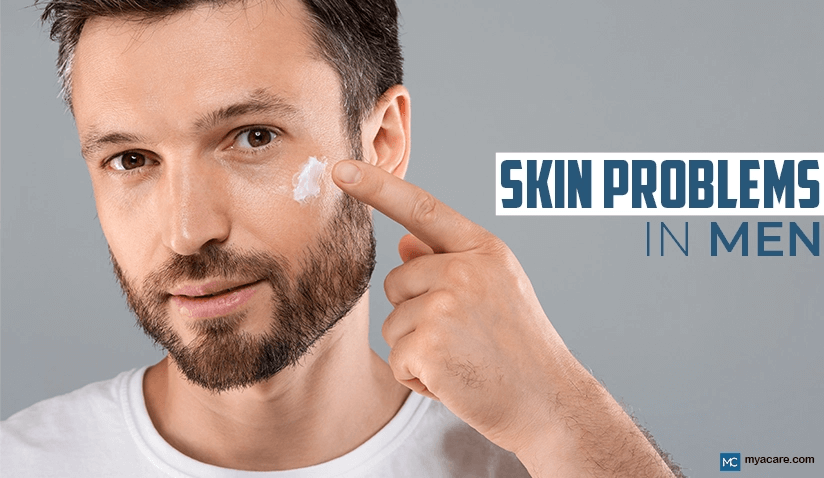Skin Problems in Men

Medically Reviewed by Dr. Rosmy Barrios - July 29, 2024
Men and women have different health-seeking behaviors, and this is true as well for skin problems and skin care. Women tend to be more active in caring for their skin, as well as in seeking help from dermatologists compared to men. There are differences in gender regarding the manifestation of certain skin disorders. Infectious diseases are more commonly seen in men, while pigmentary disorders, autoimmune disorders, allergic diseases, and psychosomatic skin problems are more typically seen in women. It seems as if there are more skin diseases that are female-predominant. Male-predominant skin diseases usually occur at certain ages, especially during adolescence and senescence. Certain factors such as sex hormones, behavioral factors, environmental differences, and ethnicity may play a part in these differences.
What are the Differences Between Male and Female Skin?
- Men have thicker skin (but gradually decreases in thickness starting at age 40).
- Men have thicker and more hair, leading them to shave their facial hair often.
- Men have greater sebum (oil) production, making their pores larger and their skin susceptible to barrier impairment.
- Men have greater sweat production, allowing them to harbor bacteria especially in the axillary and genital areas, leading to the development of body odor.
What are the Common Skin Problems of Men?
Men and women have very similar skin problems. The most common skin problems include the following:
DRY, ROUGH SKIN
Dry skin is a problem not just for the female population, but also for the males as well. There are many factors that can contribute to having dry and rough skin, including skin products used, changes in weather, stress, occupational dermatoses, and several others. Keeping the skin hydrated by following a good skincare routine, using moisturizers, and drinking enough water can help decrease problems with dry and rough skin.
EYE BAGS
The common aging signs, such as wrinkles, fine lines, and eye bags, affect both men and women. However, while men may not be bothered by lines and wrinkles as much as women, eye bags that make one seem tired or older than they are can be concerning. To avoid eye bags later in life, the routine use of eye creams or serums that boost skin hydration and firmness can help prevent drooping, darkening, and puffiness of the eyelids. Unfortunately, most men tend to neglect their facial skincare, but for those that do not, the long-term benefits should be evident in later years.
SUN DAMAGE
Commonly affecting the exposed areas such as the nose, forehead, and cheeks, sun damage is a common cause of skin problems in men. Excessive sun exposure, especially without wearing sunscreen or other protective gear such as hats or sunglasses, can result in sun-damaged skin. Sun damage can cause skin problems such as sunburn, dark spots, age spots, dullness, wrinkles, sagging skin, and uneven pigmentation. Regardless, during the peak hours from 10 am to 2 pm, it is advisable to avoid sun exposure (even with sunscreen) to prevent sun damage due to excessive UV ray exposure.
FREQUENT REDNESS OF THE FACE
Persistent facial inflammation and redness can be caused by a chronic skin condition called Rosacea. Rosacea typically affects those over 30 and can present on the cheeks, forehead, chin, or nose. Less commonly, it can affect the chest, ears, neck, or scalp. The disorder tends to worsen with time resulting in ruddier skin and visible blood vessels in the affected areas. Left untreated, the condition can lead to permanent redness, a swollen nose, and thickened skin due to excess tissue.
OILY SKIN AND ACNE
As previously mentioned, men produce more oil on their skin. Male hormones, called androgens, contribute to the increase in the size of the oil glands, leading to increased secretion of oil and the appearance of larger pores and greasy skin. This can play a part in the pathogenesis of acne. The combination of oil, dirt, and bacteria can clog the hair follicles, causing an inflammatory reaction, and leading to the appearance of acne lesions.
It is important to cleanse the face at least twice daily with a gentle cleanser. Using a moisturizer and maintaining good hygiene can help maintain good skin and decrease skin problems.
SKIN PROBLEMS RELATED TO SHAVING
Male hormones also contribute to hair growth on the face (except the eyebrows and eyelashes); therefore, males tend to have thicker hair on these areas and shave them more frequently. Constant shaving can lead to skin problems such as irritation, redness, dryness, folliculitis, and ingrown hair.
It is important to cleanse the face before shaving. Use a clean blade or razor, and change them regularly to avoid infections. For those with sensitive skin, or those prone to having curly beards or ingrown hairs, an electric razor is recommended. Electric razors are less irritating and easier to use. It also helps to use shaving cream and aftershave. Aftershave balms are better for those with drier and sensitive skin, as it helps soothe irritation.
SENSITIVE SKIN
Women are more likely than men to report having sensitive skin. However, over the years, men have been more conscious and aware of their skin issues. Men have reported skin reactions to the products they use, including laundry detergents and fabric softeners.
It is important for men to determine ingredients that can irritate their skin in order to avoid products that contain these in the future. Coupled with avoidance of these irritating ingredients, having a proper skin regimen as advised by a dermatologist is key to caring for their skin.
INFECTIOUS SKIN DISEASES
Many infectious diseases are male-predominant, such as fungal infections. This can be attributed to multiple factors, including high exposure risk and persistent outdoor activities, making them susceptible to acquiring fungal infections. When affected by these skin diseases, it is better to consult with a dermatologist in order to be diagnosed and treated properly. For fungal infections, topical and oral antifungals may be given according to the severity and type of fungal skin disease. In many cases, topical antifungals can already help clear up fungal infections. Some examples include clotrimazole, ketoconazole, miconazole, terbinafine, and sertaconazole creams. For more severe or widespread infections, oral antifungals may be a better option. Some examples of oral antifungals include itraconazole and fluconazole.
How Can Men Care For Their Skin?
Check product labels and ingredients: Knowing your skin type and choosing appropriate products is vital for skin care. Skin types are commonly classified as sensitive, normal, dry, oily, or a combination of these. Depending on your skin type, the efficacy of certain products for skin problems and the safety of these products would differ. Men typically have oilier skin types; hence, gel formulations are more suitable for their skin. For other problems such as acne, fine lines, wrinkles, or pigmentation, products with active ingredients such as retinoids can be used, under the guidance of a dermatologist.
Use a facial cleanser and moisturizer daily: The ingredients in regular bars of soap can cause skin dryness. Instead, it is advisable to use a gentle facial cleanser with lukewarm water to wash your face daily. By using a moisturizer, you can reduce the appearance of fine lines and wrinkles and give your skin a more youthful, glowing appearance. Apply skin-type appropriate moisturizer to your face and body immediately after a shower, bath, or shaving, while the skin is still damp, for optimal benefits.
Pay attention to your shaving practices: For hair-bearing areas of the face with thick hair, regular shaving may be done to prevent bacterial or fungal growths and other forms of irritation. Razors should be clean and should be changed regularly as well. Using shaving cream and moisturizers can help protect the skin barrier.
Routine skin checks: New skin changes such as spots or moles should not be ignored. It is advisable to consult a dermatologist if you observe any suspicious changes especially coupled with itching, bleeding, or a change in color. Statistics show that men over 50 are at higher risk of skin cancer, compared to the public at large. Skin cancer is, however, quite curable when detected early.
When outdoors, always use sunscreen: Using sunscreen with at least SPF 30 on all exposed skin areas, including the ears, scalp, neck, and lips, can help prevent wrinkles, dark spots, and even skin cancer. Other sun safety measures such as UV protective sunglasses, full-sleeved and long-length clothing, hats, umbrellas, and seeking shade can also be helpful.
Take-Home Messages
Gender differences in skin diseases are affected by a multitude of factors, including hormonal regulation, genetic disposition, environmental factors, and sociocultural backgrounds. In general, women are more proactive in taking care of their skin compared to men. Therefore, it would be beneficial for men to seek consult with a dermatologist regarding their skin issues, so that a clear regimen may be started, and proper management may be given to treat specific skin problems.
To search for the best health providers for dermatology in Croatia, Germany, Greece, Italy, Malaysia, Singapore, Slovakia Spain, Thailand, The UAE, the UK, and the US, please use our free search engine.
To search for the best healthcare providers worldwide, please use the Mya Care search engine.
The Mya Care Editorial Team comprises medical doctors and qualified professionals with a background in healthcare, dedicated to delivering trustworthy, evidence-based health content.
Our team draws on authoritative sources, including systematic reviews published in top-tier medical journals, the latest academic and professional books by renowned experts, and official guidelines from authoritative global health organizations. This rigorous process ensures every article reflects current medical standards and is regularly updated to include the latest healthcare insights.

Dr. Rosmy Barrios is an aesthetic medicine specialist with international work experience. She earned her physician diploma at the Universidad Del Norte’s School of Medicine in Barranquilla, Colombia, and her specialty at John F. Kennedy University in Buenos Aires, Argentina. Dr. Barrios is a member of the Pan-American Aesthetic Medicine Association (PASAM) and the Union Internationale de Médecine Esthétique (UIME). She is an expert health writer with keen interests in aesthetic medicine, regenerative aesthetics, anti-aging, fitness, and nutrition. Currently, Dr. Barrios heads the Regenerative Aesthetics department at a renowned Internal Medicine clinic based in Belgrade, Serbia.
References:
Featured Blogs



